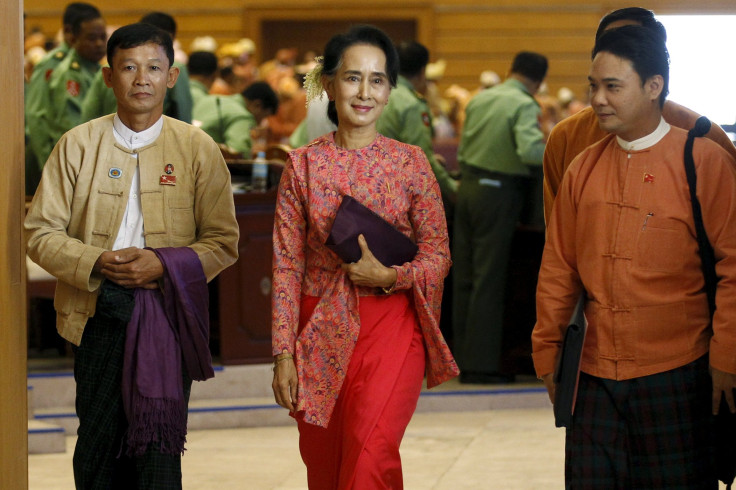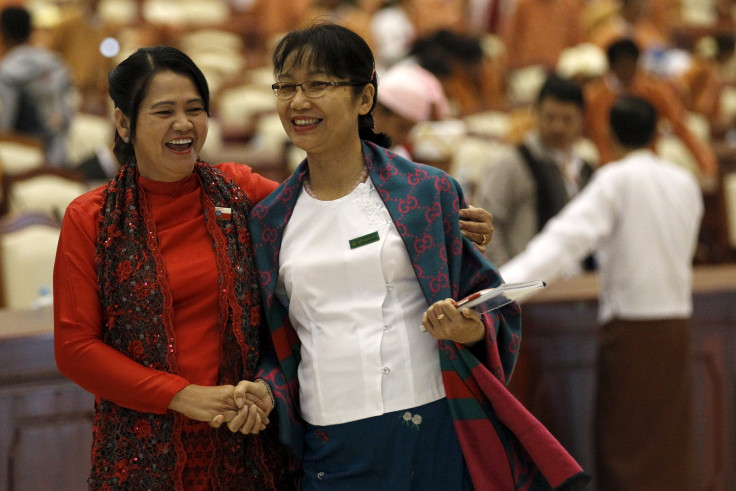Myanmar Elections: Can Aung San Suu Kyi Be Named Next President?

Setting a clear timeline for the transition of power from the military to a democratically-elected government, Myanmar’s Parliament reportedly set March 17 as the date for submission of names of presidential nominees.
Myanmar’s Parliament, which held its first session Monday with legislators elected in the historic November vote, announced that parliamentary committees would start discussing the nominees on March 17, Myanmar Times reported. There would be three candidates, once each nominated by the lower and upper houses of Parliament, and the third nominated by the military.
Once the names are announced, the 664-member Parliament would vote on the three nominees and the winner would become president, while the other two nominees would both become vice presidents, according to the Associated Press (AP). It was not know when the voting would take place but the term of current President Thein Sein ends March 31, and his successor must take office April 1.
“I hereby announce that the meetings of the three presidential electoral colleges will be held effective March 17,” joint chamber speaker Mahn Win Khaing Than said in Parliament, Reuters reported.
It is widely believed that Aung San Suu Kyi’s political party, National League for Democracy (NLD), will get the president’s post, as well as a vice president’s seat, since it has a majority in both the houses of the Parliament.
However, a clause in the country’s constitution — Article 59(f) — bars anyone with a foreign spouse or children from becoming president. That prevents Suu Kyi — whose late husband was British, as are her two sons — from taking the top spot.
She and her party members have been negotiating with the military and its commander-in-chief General Min Aung Hlaing for their support to amend the constitution, which requires over 75 percent of votes in the Parliament. The military holds 25 percent of the seats — which are not voted for — and therefore, Article 59(f) cannot be scrapped without its agreement.
Suu Kyi has publicly said she would rule the country “standing above the president” if she couldn’t be president herself, a fact that could help push the negotiations in NLD’s favor, Reuters reported, citing diplomats close to the process.

NLD has also been reportedly contemplating suspending the clause, instead of trying to change the constitution, since a temporary suspension required only a majority support in the parliament where NLD holds almost 60 percent seats.
“This suspension is in line with the constitutional rules, because it is not amending the constitution directly, but just temporarily suspending the clause,” Ko Ni, a legal adviser to the NLD, said, the Wall Street Journal reported.
The Journal also quoted an unidentified source close to the military: “The military has already showed their intentions clearly, and the military will not accept the suspension or amendment of 59f, not at the moment.”
Late Sunday night, however, pro-government television channels Sky Net and Myanmar National Television said “positive results could come out on the negotiation for the suspension of the constitution Article 59(f),” AP reported.
Former general Shwe Mann, the former speaker of the lower house in the outgoing government and now a Suu Kyi ally, is thought to be trying to broker a deal to allow her to become president, according to the AP.
© Copyright IBTimes 2025. All rights reserved.





















